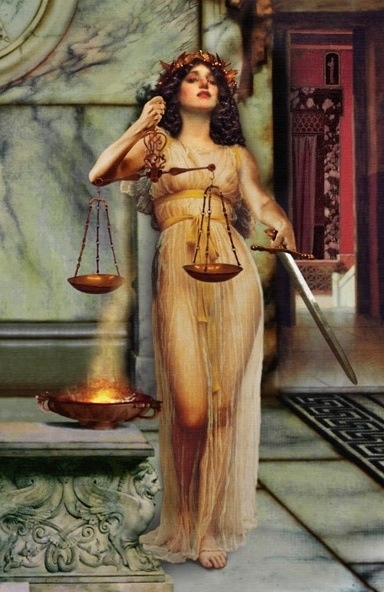Themis
Titan goddess of divine law, order and costums
Themis was the Titan goddess of divine law, order and costums. She was the daughter of Uranus and Gaea and was the messenger of the very first rules of conduct, established by the elder gods. Her place was at Oracle of Delphi, where she was one of the early prophets, second more precisely according to Aeschylus.In the role of divine voice (themistes), she first instructed the primal laws of justice and morality to mankind.
Some of these were the precepts of piety, the rules of hospitality, good governance, conduct of assembly, and various offerings to the gods. Themis was also known to be the counsellor of Zeus, advising the king of the gods on the conduct of men. Alongside her daughter Dike(justice), she would have reported to Zeus, if the primal laws had been breached by anyone. She is also said to had gathered the gods at the assembly on Olympus on the orders of Zeus.
Prophecies of Themis
In her time, Themis proclaimed some of the most famous prophecies, such as the fall of the Titans, where she prophesied that the war will not be won by brute strength and violence, but by respecting the counsels of craft and gaining the upper hand in the war. This probably meant that Olympians gained the advantage, when Zeus released the Cyclopes and Hekatoncheries from Tartarus.
The Cyclopes built them the weapons, while Hekatoncheries were at the scene itself, bombarding the titans with rocks. She also prophesied the death of Giants who would attempt to dethrone Zeus and the world after the flood where she later also instructed Deucalion, son of Prometheus, and Pyrrha, daughter of Epimetheus, to repopulate the world after the flood with throwing "bones" of their "mother" behind their shoulders.
According to some authors, she also warned Zeus about marrying to Tethis, but the other authors are crediting Prometheus with this particular prophecy. According to Aeschylus' Prometheus Bound, Themis is also credited to be the mother of Prometheus, so their shared visions may not be so far-fetched.
Horae and Moirai
Themis was not only the counsellor of Zeus, but was one of his earliest brides and together they gave birth to Hours and Fates who together represented the establishment of natural law and order. Despite being one of the favourites of Zeus, she was, according to Ovid's Fasti, overlooked by Cronus and the titans and was relegated to the lowest place in the pecking order.
Horae (seasons or hours)
First Generation
Auxo or Auxesia goddess of spring growth who increased growth and prosperity to the fields.
Carpo or Karpo goddess of the fruits of the earth. She represented Autumn and was worshiped alongside Auxo by the ancient Greeks.
Thallo goddess of spring buds and shots. She was representing summer and plant raising.
Second Generation
Dike or Dice goddess of fair judgements, based on rules, costums and moral order. She was the enemy of all falsehood and the protectress of wise administration of justice.
Eirene or Irene goddess of peace and seasons of the spring. She is identified as Hora Thallo in Hesiod`s Theogony.
Eunomia goddess of order and law. She was representing internal stability in society. The Greeks also knew her as the spring goddess of green pastures.
Moirai (fates)
Atropos or Aisa goddess of inevitable. She was the oldest of three fates and determined the mechanism of death for all mortals.
Clotho goddess of spinning the thread of lives. She had control over the decision of who was born and also decided whether the lives of the mortals or gods were to be saved or to extinguish.
Lachesis goddess of destiny. She was measuring life spun which was spinning by Clotho and therefore determined the life thread of all mortals and decided how much time for life was to be allowed for each being.
Other myths
Themis is also said to had helped Leto, along with her sisters Theia and Rhea, with birth of Apollo and later suckled him with heavenly nectar and ambrosia. According to Ovid's Metamorphoses, Themis was the one who released the Sphinx to Thebes to annoy the travellers with its riddles. And once Oedipus solved the riddle and destroyed the Sphinx, Themis was heartbroken and angered. Without delay, she sent another savage beast, this time to ravage the city.
[1]













